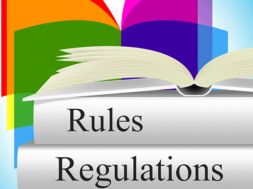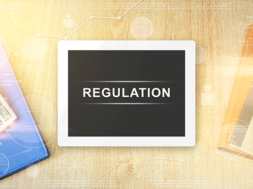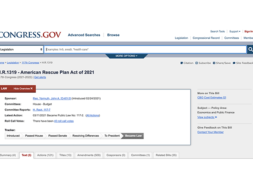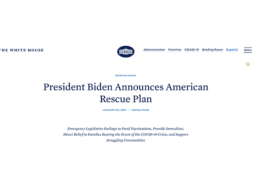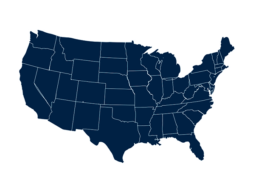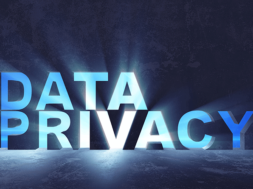
Incentive Compensation: Who is Subject to the Ban? Who is Not?
By Robert B. Walker Jr., Senior Associate, Ritzert & Leyton, PC
Disclaimer: The contents of this article do not constitute legal or regulatory advice or counsel. Neither do they establish an attorney-client relationship of any sort. No person or entity should act, or refrain from acting, on the basis of the information discussed herein without seeking individualized, professional counsel as appropriate.
Every institution of higher education should know that the Higher Education Act imposes a statutory prohibition upon the payment of incentive compensation. To enforce the statute, the United States Department of Education (“ED”) has implemented regulations further defining the contours of the incentive compensation ban. Thus, no institution may “provide any commission, bonus, or other incentive payment based in any part, directly or indirectly, upon success in securing enrollments or the award of financial aid, to any person or entity who is engaged in any student recruitment or admission activity, or in making decisions regarding the award of Title IV.” (34 C.F.R. § 668.14(b)(22).)
Compliance with the incentive compensation ban remains a significant area of ED’s enforcement focus.
It also remains an active area for litigation, particularly for whistleblower claims brought under the False Claims Act.
As a result, ensuring compliance with this regulatory prohibition must be an area for regular review, analysis, and action for each and every Title IV institution. This article describes practical situations in which compensation-related issues and questions often arise. The ultimate purpose is to help institutions focus their energy and efforts toward maintaining compliance with the incentive compensation ban.
Despite the fact that the incentive compensation ban has existed since 1992, it remains an area ripe with confusion, particularly with regard to how an institution may compensate those employees responsible for admissions and financial aid.
Much of this confusion stems from ED’s 2002 enactment of the “safe harbors” and their subsequent elimination by ED in 2010. When it published the safe harbors, ED attempted to provide much needed clarity as to what types of compensation would not be deemed to violate the underlying statutory prohibition. However, during rulemaking in 2009 and 2010, ED argued that institutions had abused the “safe harbors.” It therefore eliminated them when it published revised regulations effective July 1, 2011, reasoning that the statutory language itself provided sufficient clarification as to which institutional practices would (and would not) violate the ban. (See 75 Fed. Reg. 66872-79 (Oct. 29, 2010) (codified at 34 C.F.R. § 668.14(b)(22) (July 1, 2011)); see also, March 17, 2011 Dear Colleague Letter (GEN-11-05) at 8.)
Experienced practitioners and those with experience in the higher education sector recognize that lingering questions abound as to what practices do (and do not) constitute the payment of prohibited incentive compensation. The following are questions and answers to some of the more confusing practices.
How does ED direct an institution in determining if a violation of the ban may occur?
- ED’s guidance recommends using a two-part test to assess whether something constitutes illegal incentive compensation. (See 75 Fed. Reg. 66873 (Oct. 29, 2010).) The two-part test is as follows:
- First, is the compensation a commission, bonus, or other incentive payment (i.e., is it “a sum of money or something of value”) given for services rendered?
- Note that this is a rather broad definition that may encompass things other than money (e.g., gifts, meals, trips, extra vacation time, etc.).
- Second, is the compensation paid to someone engaged in recruitment or financial aid-related activities and based in any part, directly or indirectly, upon success in securing enrollments or the award of financial aid?
- If the answer to both aspects of the two-part test is “yes,” then the proposed incentive may violate the ban.
Is a campus president subject to the ban upon the payment of incentive compensation?
- The short answer is “yes,” because the ban applies to every individual employed at a Title IV-eligible institution (as well as independent contractors, consultants, or other third-party service providers). However, the prohibition only applies to an individual if he or she “undertake[s] or [has] responsibility for recruitment and decisions related to securing financial aid.” (See March 17, 2011 Dear Colleague Letter (GEN-11-05) at 8.)
- Thus, the critical question to consider is whether the campus president’s job duties include so-called “covered activities,” which would subject him or her to the ban. In the admissions area, ED defines “covered activities” as “[t]argeted information dissemination to individuals;” “[s]olicitations to individuals; and [c]ontacting potential applicants [or] aiding students in filling out enrollment application information.” (GEN-11-05 at 8.) If the campus president does not engage in this type of activity, then he or she is not subject to the prohibition upon the payment of incentive compensation pursuant to ED’s own guidance.
If a college president’s interactions with prospective students are limited to meeting them while passing through a hallway and providing general information about the benefits of a college education or attending a particular institution, does this subject the president to the ban?
- The short answer is, “no.” In fact, ED uses this exact example as an instance when a college president’s activities “would not violate the incentive compensation prohibition.” (GEN-11-05 at 13; see also, 75 Fed. Reg. 66874 (Oct. 29, 2010).)
- However, this can be a very fact-intensive question. Generally, an individual whose job duties are exclusively related to policy-making, that is, in making decisions involving “the manner in which recruitment, enrollment, or financial aid will be pursued or provided,” then he or she is not subject to the prohibition upon the payment of incentive compensation. (See GEN-11-05 at 12-13.) However, one must carefully consider what job duties are actually done on a day-to-day basis, not simply what an employee’s job description may state.
For instance, even a single meeting between an employee and an individual prospective student to discuss program offerings or any other detailed information about an institution likely subjects that employee to the ban.
Does ED provide any other guidance which identifies or defines the types of job duties which are not considered “covered activities” and therefore not subject to the ban?
- Yes, ED’s guidance states that “[b]road information dissemination;” “[a]dvertising programs that disseminate information to groups of potential students;” “[c]ollecting contact information;” “[s]creening pre-enrollment information to determine [if a student meets admission standards];” and “[d]etermining whether an enrollment application is materially complete, so long as the enrollment decision remains with the institution” are all activities which do not implicate the ban. (GEN-11-05 at 8.) Thus, an individual who engages in these activities (and no other admissions or financial aid-related activities that would otherwise subject him or her to the ban) is not restricted (at least by the Title IV regulations) in terms of the type of compensation he or she may receive.
- Based upon ED’s guidance, perhaps the primary determinative factor as to whether an individual’s job duties subject him or her to the ban is contact with students (typically prospective students, though that is not necessarily always the case) regarding their decision to apply for admission, enroll, or seek federal financial aid. The further removed a school official is from one-on-one contact with an individual, the less likely his or her activity becomes subject to the ban. Thus, for example, “broad information dissemination” or advertising to “groups of potential students” ED defines as activities not subject to the ban. Similarly, the collection of contact information is sufficiently removed from a student’s decision to enroll (or seek financial aid) that ED lists it as a “non-covered” activity.
Do the regulations prohibit an institution from terminating an individual for failure to enroll students?
- ED’s guidance does not speak directly to this issue and the regulatory definition of “compensation” is quite broad: “[a] sum of money or something of value positive, other than a fixed salary or wages, paid to or given to a person or entity for service rendered.” (34 C.F.R. § 668.14(b)(22)(iii)(A).) The regulations seem to contemplate an affirmative transfer of something of value for a violation to have occurred. Moreover, the fact that the definition states that compensation is something “other than a fixed salary or wages” also supports the position that the simple fact of paying a salary or wage is beyond the scope of the ban. Finally, it does seem unreasonable to conclude that hiring someone to work as an admissions or financial aid representative constitutes a lifetime appointment.
- Of course, some plaintiff’s counsel have attempted to litigate the issue and argue that terminating an admissions representative based upon his or her failure to enroll students constitutes a violation of the ban. Thus far, at least one federal district court has not accepted this argument, instead holding that “the decision to fire an employee is not covered by the [Higher Education Act’s statutory ban upon incentive compensation] because termination is not a prohibited commission, bonus, or other incentive payment.” (U.S. ex rel. Bott v. Silicon Valley Colleges, 262 F. App’x 810, 812 (9th Cir. 2008).)
Are personnel employed in a college’s job placement or career services department subject to the incentive compensation ban?
- The short answer is typically “no.” But again, the analysis may be a fact-intensive based upon what duties the employee actually carries out and/or participates in on a daily basis. Generally speaking, applying ED’s two-part test suggests the job duties are unrelated to decisions regarding enrollment or awards of financial aid. Accordingly, it is unlikely that a bonus payment provided to an employee in a job placement or career services departments would violate the ban. However, if the employee interacts with individual students regarding their decision to enroll, such activities may mean the ban applies.
How can a college make adjustments to salary that does not constitute a violation of the ban?
- ED’s guidance allows an institution to “use factors such as seniority or length of employment as a basis for compensating employees covered by the incentive compensation prohibition.” (GEN-11-05 at 13.) Other qualitative evaluative factors “may also be used so long as they are not related to the employee’s success in securing student enrollments or the award of financial aid.” Id. Please remember that giving more than one salary adjustment in a calendar year is presumed by ED to constitute the payment of incentive compensation. (34 C.F.R. § 668.14(b)(22)(i)(B).)
- Accordingly, institutions should take care to implement objective evaluation criteria, document the basis for performance evaluations (including back-up information supporting any rankings or scores given), and link that criteria directly to salary adjustments in an objective fashion. In many instances, having an independent third party review an institution’s proposed salary adjustment policy can identify potential compliance concerns in advance.
ED (and others) will closely scrutinize any standard evaluative factors to confirm they do not relate (even indirectly) to success in securing enrollments and to confirm they are valid, objective factors supported by data.
An institution’s director of career services proposes to give gift cards to graduates who complete a form advising the school about their current employment status. Does this raise concerns about a violation of incentive compensation?
- Applying ED’s two-part test under these facts, the institution must consider:
- First, does the proposed compensation constitute a commission, bonus, or other incentive payment given for services rendered?
- Yes, a gift card, no matter how small or large the denomination, constitutes something of value.
- Second, is the compensation paid to someone engaged in recruitment or financial aid-related activities and based in any part, directly or indirectly, upon success in securing enrollments or the award of financial aid?
- No, the proposed compensation would be paid to graduates, not individuals engaged in admissions or financial aid activities. In addition, the compensation is being provided for a specific act – completing the career services form. As the basis for the compensation is untethered to an enrollment decision or the award of financial aid, there is no basis to conclude providing the gift cards (presuming they do not violate an unrelated regulatory or accreditation requirement) constitutes an incentive compensation violation.
The campus president would like to provide a bonus payment to members of the institution’s program advisory board (“PAB”) based upon the time they dedicate to their work as board members as well as substantial improvements in student outcomes as a result of recommended changes to some of the school’s programs. Some of these same PAB members occasionally refer students to the school. Would this arrangement violate the incentive compensation ban?
- Again, ED’s two-part test provides the framework to analyze this issue. First, a bonus payment is “something of value” and it is given to for service on the PAB. As a result, it is certainly compensation as contemplated by the ban. Second, there exists the argument that this compensation is being paid to someone who is engaged in a recruitment activity because the PAB members sometimes discuss the school with individual prospective students and refer them to some of its programs. However, the compensation is not being paid, directly or indirectly, based upon success in securing the enrollment of these students. Instead, it is being paid for service on the PAB as well as the success of the PAB’s recommendations. In this instance, it is unlikely that this arrangement violates the ban.
- It is recommended that the institution explicitly and carefully document the basis for the proposed payments to the PAB. Such documentation should define exactly why the bonus is being paid and include the necessarily underlying detail for an outside regulatory to conclude the payment is not based in any away upon success in securing enrollments (or the award of financial aid).
Navigating the waters of the incentive compensation ban can often prove treacherous. However, advance planning, careful consideration of ED’s guidance (and the regulatory language), and thoughtful implementation of evaluation and compensation policies will help an institution avoid compliance problems. Clarity in setting and implementing policies must remain the primary objective for an institution to preclude later arguments that it violated the ban.

Robert (Ben) Walker, Jr. has been admitted to practice law in the Commonwealth of Virginia since 2005. He works with Ritzert & Leyton’s postsecondary education law group and has participated in a broad range of litigation and investigatory matters, including state and federal civil cases, as well as regulatory and civil issues involving the U.S. Department of Education, state agencies, and accrediting agencies.
He has also focused on criminal investigations, including issues involving or relating to the administration of Title IV, HEA program funds. Mr. Walker also assists clients assess and address compliance matters, such as those related to Title IV, Title IX, and the Clery Act.
Mr. Walker received his law degree from the University Of California Hastings College of Law. He received a Bachelor of Arts degree from the University of Virginia.
Contact Information:Robert B. Walker Jr. // Senior Associate // Ritzert & Leyton, PC // 11350 Random Hills Rd #400 Fairfax, VA 22030 // 703-934-9834 // bwalker@ritzert-leyton.com

